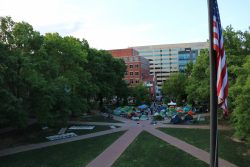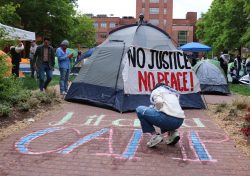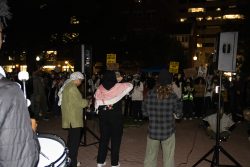Members of the Georgetown Committee on Free Speech and Expression addressed students and faculty members Tuesday night to explain the history and goals of the current Speech and Expression Policy and a possible addition to the it. The discussion comes after much debate on the addition which emphasizes that the Vice President of Student Affairs can take away anonymous publications from public distribution places if he considers them “grossly offensive.”
“The whole point of the University is the exchange of ideas, the critique of ideas and conversation,” said James Walsh, S.J., a Theology professor and member of the committee.
According to Walsh, the University’s freedom of speech policy came about after Georgetown students were arrested in 1986 for protesting apartheid on campus without permission. The Vice President of Student Affairs at the time determined that a policy should be implemented to regulate speech, expression and demonstration.
Because Georgetown is a private university, it does not have to protect the first amendment rights of its students, according to Peter Byrne, a professor at the Law Center and member of the committee .
Students are guaranteed certain rights to expression under the University’s policy, which, “allows for liberalism, but draws the line against specific attacks,” said Juan Gonzalez, the current vice president for Student Affairs.
Byrne said that the proposed addition to the policy targets sub-intellectual speech that is grossly offensive on the basis of race, gender and religion. On these grounds, the University should be allowed to confiscate anonymous publications, such as a last semester parody of a campus newspaper, The Hoya.
Byrne said the University intends to create opportunities for people with opposing viewpoints to participate in a dialogue. Anonymous publications do not offer students the chance to discuss issues, and therefore are of no value to the University community.
“Anonymous publications that revile people due to ethnicity, gender, sexual orientation, et cetera are troublesome under the policy and may come under a disciplinary norm as well,” Byrne said.
Walsh added that the proposed addition “reflects Georgetown’s Catholic values, in that it shows the University’s commitment to fostering understanding of the world,” Walsh said.
When asked how the University goes about creating a forum for discussion, Walsh stated that the issue should be spotlighted to increase community awareness, but not to the extent that it causes any further harm. “One has to be thoughtful in how one proceeds,” Walsh said.
Walsh said that Red Square’s designation as a “free speech zone” a space for ideas to discuss freely. Walsh said that both University supported and non-supported groups use the square as a method of raising awareness to their causes.
The committee members said they constantly discuss the issue of how far the University community can go in creating workable standards for self-expression. Although the proposed addition has not yet been approved, the members of the committee said that a constant dialogue about free speech can only strengthen and improve the policy.




